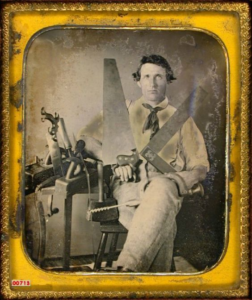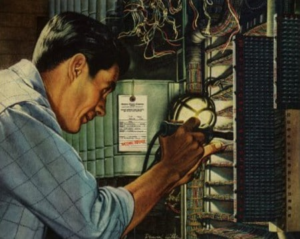Source:
“Reviving Blue Collar Work: 5 Benefits of Working in the Skilled Trades” by Jeremy Anderberg
Art of Manliness / November 24, 2014, Last updated: May 28, 2018
| 5 Benefits of Working in the Skilled Trades
 A couple weeks ago, I outlined and (hopefully) debunked four common myths about skilled labor. While these stereotypes about blue collar work may have been true 50 years ago, they simply aren’t the case in today’s world.
A couple weeks ago, I outlined and (hopefully) debunked four common myths about skilled labor. While these stereotypes about blue collar work may have been true 50 years ago, they simply aren’t the case in today’s world.
In the 90s and early 00s, everything was about the business world. Wall Street was going gangbusters, this new fangled thing called the internet was taking off, and dream jobs were those in which you sat in an office with a computer and made millions. Those jobs were not terribly difficult to come by. Today’s youth have those same notions of where the good jobs are, but nowhere near the same success in finding them. While the job market is improving from the economy’s nosedive six years ago, it’s still not what it was pre-recession, especially for new college graduates, for whom the unemployment rate is at 8.5%, versus 5.8% for the workforce as a whole. It’s time young people looked outside the white collar box when it comes to landing a steady, good paying job.
My aim with this article is to convince you that blue collar jobs are in fact what some young men ought to aspire to, just like they aspire to be a lawyer or banker. I’m not trying to convince you that blue collar jobs are better (though in some cases they will be, just as in some cases white collar jobs will be better), but that they are simply on par with office jobs by nearly every measurable factor in terms of what makes a career a “good” one. That’s the stereotype that most needs breaking — that blue collar careers are beneath white collar ones and less desirable. The simple reality is that they aren’t, and here are 5 good reasons why:
The vast majority of training programs for the skilled trades, on the other hand, last from 6 months to 2 years, and will cost just over $30,000. Even if that cost is entirely financed by student loans, you’re looking at a total of $40,000, which is still a savings of at least $110k!
This makes for a huge opportunity cost for those going to 4-year colleges. You’re spending an extra 2-3 years in school, paying tens of thousands per year, while the tradesman is already graduated and earning money (in some cases, making six figures as a 21-year-old).
One final factor is simply that some 18-year-olds aren’t ready for a college environment. You’re thrown off the cliff from your warm and comfortable home life into total independence. It’s not an easy transition for anyone; in fact, about 40% of all undergrad enrollees will drop out before earning a degree.
Trade school offers a nice on-ramp to independence. You’ll often stay close(r) to home, you receive real-world, hands-on training from the get-go, and you aren’t spending every waking moment with folks your same age and in the same position in life (which can make for a difficult social transition once out of college). Again, there are certainly benefits to attending a 4-year university (we’ve outlined the pros and cons here), but the big pros of trade school are that you’ll save a lot on tuition, start being able to make money sooner, and can start taking measurable steps towards adulthood more quickly.
When we’re weighing which types of jobs to apply for, or even which to accept from multiple offers should we be so lucky, the differentiators often come down to benefits. Pay, job security, balance, work environment, etc. For too long the skilled trades have been neglected as not having any benefits. Thankfully, the tide is turning, and people are starting to see that blue collar work offers some real advantages over white collar work. There are jobs available, pay is good, job security is excellent, and the satisfaction may be greater than being in the information industry.
In some cases and for some people, better jobs and benefits will come as a result of a 4-year degree and being in an office setting. That’s just fine. But for some folks, that’s just not the case. My hope is that the young men reading this, as well as the seasoned men considering a career move, will weigh all their options, and determine what’s best for them and their future.

 Compensation is important, but only the third most important factor in overall job satisfaction. The first is actually “opportunity to use skills and abilities” (more on that below) and the second is job security. So while pay in the trades may be commensurate with white collar work, for some, these other factors will boost this type of work ahead of occupying a cubicle.
Compensation is important, but only the third most important factor in overall job satisfaction. The first is actually “opportunity to use skills and abilities” (more on that below) and the second is job security. So while pay in the trades may be commensurate with white collar work, for some, these other factors will boost this type of work ahead of occupying a cubicle.
 Above, I mentioned that the number one factor in overall job satisfaction is being able to use your skills and abilities. It was in 2012 when that factor overtook job security for the first time, just four years removed from the economy crashing. People are quickly discovering that feeling happy and fulfilled at work is incredibly important.
Above, I mentioned that the number one factor in overall job satisfaction is being able to use your skills and abilities. It was in 2012 when that factor overtook job security for the first time, just four years removed from the economy crashing. People are quickly discovering that feeling happy and fulfilled at work is incredibly important.